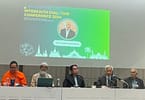The first years of the 21st Century have been exceptional for the global world and the travel and tourism sector. Looking back at the end of the 20th Century and looking forward today from our evolving 21st Century vantage point, change in the sector is truly inspiring. Growth by all accounts has been phenomenal. Increased mobility, stability, activity and curiosity of people across the globe have fueled the world’s evolution from border-defined geo-nations to now boundary-less global neighbors.
But the excitement of growth in the sector is not purely about travel and travelers. It is about the underlying impact that it is having on our world socially, philosophically, economically and in many ways spiritually. With almost a billion people traveling each year as part of this ever-moving global community, the concepts of global harmony, stability and understanding become a powerful reality.
The world has been unlocked in ways never seen before. Travelers of all ages, cultures and interests are being invited to see, touch, feel and embrace new places, new people, new possibilities of understanding and a new promise for global connectivity. The travel experience, one which often has an enduring impact on the traveler far beyond the return journey home and sharing of stories around the dinner table, always has an enduring impact on the growth and development of the travel destination itself. It is impossible for a region or nation, for any destination, to open its doors to the world and not be “touched.”
The “touch” of a traveler can, however, be positive or negative.
GOLDEN TOUCH
Tourism brings with it rich, seasonal injections of exposure, excitement and foreign exchange. These imports increase greatly the attractiveness of the sector, inspiring destinations around the globe to invest in sector promotion. International travel and tourism trade fairs from Berlin to Brisbane have become centers of rich concentration of color, fantasy and promise. And they have become forums of intense commercial activity and competition. The business of tourism has become very serious, very lucrative, very fashionable and very aggressive.
Globally there is immense excitement about the potential, promise, pride, profile and sheer passion generated for a destination as a result of tourism.
With relatively low barriers to entry onto the global tourism stage compared to other high-return industries, the excitement around tourism has the ability to unite people of all parts of society, all sectors around the transformation of their “home” into a highly compelling, and competitive tourism destination.
However, for all of the rich rewards of tourism there are also great risks. And these risks are real, immediate, penetrating and potentially irreversible: risks to the environmental sustainability, risks to greater economic stability, risks to local culture, risks to social value systems to name a few. Simply put, in buying into the tourism phenomena, a destination can face the risk of selling its soul.
Which is why it is fundamentally believed that to enable the tourism sector to truly work for the destination, clear, visionary, focused leadership of the by government is vital.
STRATEGY UNLOCKING ENERGY
When a government takes the strategic decision to embrace tourism as a key driver of social and economic growth something very interesting starts to happen. With this decision a nation makes a pledge to open its doors to the world, hosting curious minds and hearts of people of all walks of life on its home soil. Citizens become ambassadors, culture becomes national character, places become pride-filled attractions, experiences become stories, and strangers become friends.
Importantly, people from across the destination, people of all ages, skill levels, backgrounds and beliefs have, through tourism, an opportunity to actively and meaningfully participate in the sector in a way which empowers and inspires the people, economy and future of the destination. This is not, however, by chance.
The energy generated by tourism is as a result of a vision, an inspiring view of what the destination can become as a result of tourism.
Underlying this vision must, however, be a clear, comprehensive plan – a definitive HOW of destination growth and development.
At the heart of the tourism sector, as all good business thinkers know, must be the presence of a solid tourism strategy. Strategy provides the framework for fulfillment of defined, measurable objectives. For as individual as tourism is, nations transforming themselves into compelling, competitive and clearly differentiated destinations must establish strategies, systems and processes to ensure that the sector can indeed deliver against specific tourism objectives.
But the development and growth of a successful tourism sector is not simply about a successful tourism strategy, no matter how brilliant the strategic thinking may be. The strategy is key. Without it the destination risks throwing its doors open to the world and, for lack of better words, selling its soul – losing its culture, character and care for one another for the purpose of making money through tourists. Cross messaging, cross purposes, cross wires. Ultimately canceling out opportunity.
Strategy is to a tourism sector what sheet music is to an Orchestra. It is the direction, the focus and the framework.
But is it merely paper – ink on lines with huge promise and desire to create something beautiful – until brought to life through the hands, heart and eyes of the conductor. For the tourism sector that conductor is the government of the destination, the source of vision, inspiration and disciplining direction which turns passion into proud, purposeful, clearly positioned tourism marketing and experience excellence.
Why is the involvement of government really necessary, when in many ways tourism is a relatively easy industry for anyone living in the destination to participate in? Advertising and marketing agencies know how to successfully promote and advertise. Travel agents know how to successfully sell holidays. Hoteliers know how to successfully run hotels. Restaurants know how to successfully serve fabulous local meals. And artisans know how to create curious and other keepsakes for tourists to buy and take home as gifts. Why is it necessary for government to play a part? Simply this: Tourism is not purely for tourism sake.
To operate effectively for long-term benefit of the destination government must mobilize the tourism sector as a critical driver of the greater:
• Economic,
• Social,
• Cultural,
• Industrial, and
• Infrastructural
development of the destination for its people and their future.
Like the conductor of the orchestra, the government of the tourism destination has the greater:
• Sense of vision,
• Competitive market intelligence,
• Executional insight,
• Ability to bring all members of the orchestra together, and
• Access to resources
to turn what is on paper into passionate, purposeful, integrated performance, which most consistently and creatively attracts target audiences who will most appreciate and most enthusiastically visit, the destination.
TWO LEVELS OF PERFORMANCE
Generally speaking, leadership of the tourism sector by government is
required at two fundamental levels:
1) MACRO: Establishment of overall Tourism Strategy and Policies to ensure sustainable growth and development of the sector at social, economic and environmental levels, and alignment of sector efforts to the greater national / regional growth mandate.
2) MICRO: Brand Leadership of the destination, ensuring creative, coordinated, competitive and compliant of marketing, promotion and innovation of the destination.
Working in harmony, these two dimensions of tourism leadership ensure that the vision of the destination is brought to life through its daily expressions, ie destination brand promise, destination promotion, experience offerings, product and service delivery, policy implementation, infrastructure re- investment.
To fulfill the MACRO needs, governments mobilize Departments of Tourism
(often also referred to as Ministries) to take high level ownership and responsibility for defining the long-term direction and impact of the tourism sector including policy, participation and governance. It is these Departments (Ministries) of Tourism which are best placed to ensure that the sector strategy for tourism it directly aligned to and supportive of, the greater national economic growth and development mandate and strategy.
Ultimately government must act as a central leadership force for the
tourism sector – its industry, community, partners and principals – providing
a central source for destination:
• Strategy,
• Policy,
• Investment, and
• Stakeholder alignment
Complementing the above, at a MICRO level the creation of National Tourism Organizations (NTOs) also referred to as Destination Marketing Organizations (DMOs) and National Tourism Authorities (NTAs), have become important levers for long-term, meaningful, optimized growth and development of the destination. Each destination, however, has its own unique needs and priorities when it comes to the growth and development of the tourism sector. Form follows function. As stated by the UNWTO: “ there is no ‘one size fits all’ approach to destination marketing as needs, expectations and anticipated benefits vary greatly from one destination to another.”
Ultimately, through their destination marketing and promotional efforts, the NTO must ensure that the brand and marketing strategy for the destination are directly aligned to, and supportive of, the greater tourism sector mandate for economic growth and development, which in turn must drive that of the cross-sectoral national/regional mandate.
Each musician playing his or her own part, in accordance to the sheet music shared by all members of the orchestra, who together, are working to create something truly spectacular.
CLOSING NOTES
In the end it is as diverse as tourism destinations may be in terms of:
• positioning,
• proposition,
• profile and
• experience promise,
they share the need for inspired, visionary, comprehensive and carefully
coordinated leadership.
Just as the conductor is responsible for carefully guiding his/her musicians towards the creation of musical magic as one united force, is it government who must confidently lead the people of the destination’s tourism community, providing them the direction and inspiration they need to live and love the destination which they call “home”… and proudly share with audiences around the world whom they know will truly love their art.
WHAT TO TAKE AWAY FROM THIS ARTICLE:
- Importantly, people from across the destination, people of all ages, skill levels, backgrounds and beliefs have, through tourism, an opportunity to actively and meaningfully participate in the sector in a way which empowers and inspires the people, economy and future of the destination.
- With relatively low barriers to entry onto the global tourism stage compared to other high-return industries, the excitement around tourism has the ability to unite people of all parts of society, all sectors around the transformation of their “home” into a highly compelling, and competitive tourism destination.
- The travel experience, one which often has an enduring impact on the traveler far beyond the return journey home and sharing of stories around the dinner table, always has an enduring impact on the growth and development of the travel destination itself.






















